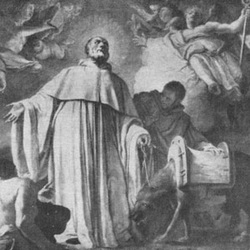
William was born of noble parents at Vercelli in Lombardy. He was but little over fourteen years of age, when, impelled by a strange earnestness for holiness, he undertook a pilgruimage to Compostella, to the far-famed Church of St. James. This journey he made clad in a single garment, wearing an iron girdle wound two-fold round his body, and with bare feet. He accomplished his object under the severest hardships of cold and heat, hunger and thirst, and at the great danger of his life. After his return to Italy, he undertook a new pilgrimage, this time to the Holy Sepulchre of the Lord. But in the way of fulfilling this, there arose divers and most grievous obstacles, whereby the hand of God drew the lad to the higher and holier life of a monk. He dwelt in the town on Monte Solicolo for two years, which he passed in constant prayer, watching, sleeping upon the ground, and fasting. At the end of this time, the power of God made him the mean to restore a blind man to sight. The fame of this miracle became so noised abroad, that William could no longer remain unknown. His thoughts turned again towards Jerusalem, and he again entered cheerfully on the journey.
He was again hindered by a vision from God, and remained among the Italians to be more useful, and to bring forth more fruit than he would have done among strangers. With extraordinary speed, he built a monastery upon the summit of Monte Vergiliano, ever since named Monte Vergine. Thither he called around him, as his comrades, devout men, and schooled them into a way of life most closely following the commands and counsels of the Gospel, in great part by a rule taken from the constitutions of Blessed Benedict, and supplemented by his own words, and the example of his own holy life.
As other monasteries were raised, the holy life of William became more known day by day, and brought men to him from all quarters, drawn by the sweet savour of his godliness, and the fame of his miracles. At his prayers the dumb spake, the deaf heard, the withered were strengthened, and they that suffered under divers and incurable diseases received health. He turned water into wine, and openly worked many other miracles. Among all these things it must be told that a wretched woman sought him to lure him to impurity, but he raked hot embers out upon the floor and cast himself down upon them, and wallowed among them, and escaped unhurt. When this thing came to the knowledge of Roger I, King of Naples, it roused in him the highest reverence for the man of God. At the last, after foretelling his own death to the King and to others, and full of good works and miracles, he fell asleep in the Lord, in the year of salvation 1142.




